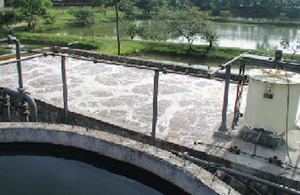DFID Research: Managing Pollution from Small scale Industry in Bangladesh
Tanneries and textile firms in Bangladesh are being encouraged to reduce water pollution affecting local communities by building effluent treatment plants

Effluent treatment plant
The growth of Small and Medium Enterprises in Bangladesh, and in the rest of South and Southeast Asia has a positive development dynamic in macro economic terms, but has brought with it a range of problems, including pollution of water resources. Many ecosystems are now under threat and with them the livelihoods of local people.
“In the past, ponds and beels were the main sources of water for this community and we used to use the water for all sorts of uses but now we can not do that. The quality of water has deteriorated so much that it has become absolutely black, oily, and it irritates when it comes in touch with our skin. Nobody would want to use this water. Now we have to depend on the tube wells - these tube wells cost us to install, more so, extra hassle to collect and store water”. (Respondent, Harinhati village)
Research led by the Centre for Water Policy and Development, in association with the Bangladesh Centre for Advanced Studies and Bangladesh Environmental Lawyers Association, looked at how to tackle this serious issue. An incentive-based approach was developed to target private sector enterprises seeking to develop a win-win solution for textile firms and tanneries. It highlighted potential savings in production processes that can offset much of the cost of effluent treatment plant (ETP) operations. The project assisted the companies in the project area with designing and developing cost effective ETPs. It provided training and developed a web site and web based self help networks for company managers and ETP operators.
Bangladesh textile firms and tanneries have been receptive to guidance on how to reduce water pollution. The establishment of ETPs allows firms to more readily meet the increasingly stringent compliance demands of international retailers, making them more attractive to international buyers looking to place orders. This in turn increases employment opportunities.
Approximately 20,000 people live in the project area and have been impacted. There are also numerous industrial clusters around the major cities, so numbers impacted in a similar way by industrial pollution could be hundreds of thousands. Better treatment of the waste will improve the local aquatic environment and the livelihoods and environment of people neighbouring the factories.
“We were well off because we used to supply fish to whole region of Dhaka and Gazipur but now there is less fish in the Mokesh-Kalidoho beels. If people know that these fish are from Mokesh Beel, they do not buy because the taste is not good. We are now suffering - both physically (due to illnesses and lack of fish) and financially”. (Fisherman in Gupinpur)
The wider textile sector in Bangladesh has benefited as the project has undertaken dissemination work through the business associations and some international retailers. The work has potentially wider benefits if these international retailers disseminate and highlight the benefits of the projects in other countries.
Tackling the project from a business perspective, has gained it a reputation for being an “honest broker” with no particular allegiances, highlighting problems and supporting developments linked to any of the stakeholders. The work sought to inform and ensure uptake by establishing links with business associations and international firms.
The Bangladesh Department of Environment has limited resources and capacity. Environmental legislation is not enforced and is open to corruption. In this context, the project has not led to policy change, but factories have voluntarily agreed to take up the project. Over the course of the project, the number of factories in the area has tripled and the pollution load is much greater than before. If this approach continues to be taken up there will be more widespread environmental improvements in water quality. This could lead to improvements in the health of the population and their livelihoods. However, uptake is slow, as enterprises are often reluctant to change working practices, and adapting to the project requires downtime on the factory floor.
For more information see the project record and outputs for Managing Pollution from Small-scale Industry in Bangladesh.